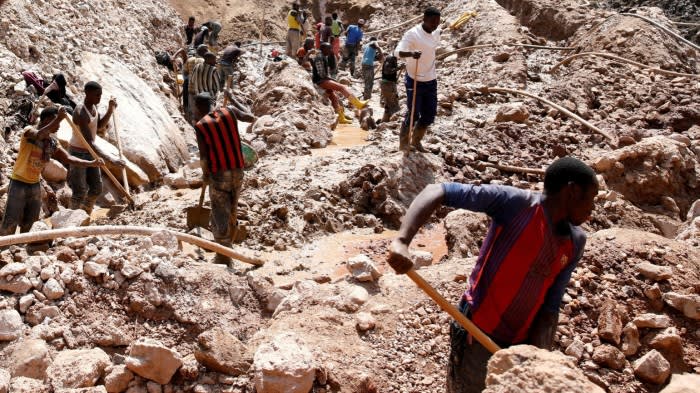Dr Solodovnikov tells us how exploring bug biodiversity through systematic entomology – the evolutionary classification of insects – is critical for humans to have a less biased view of what he calls our ‘planet of insects’.
A study last year showed a 25% drop in insect numbers, others have suggested insects could disappear within a century. Are you concerned?
Generally, I’m more worried about people than insects because I think insects will survive. But people are destroying our ecosystems. So this is more problematic for us.
The studies about insect decline and the PR part of that, generally, is good because it attracts attention to insects, it alarms about nature protection.
But when experts look in more detail at how this was measured, that may not be a long-term decline. It might be a more local decline. It’s more complex. We cannot simplify the pattern (and) say, ‘Now the trend is in 100 years all insects disappear’.
What concerns you the most?
We barely have a part of the planet which is intact. Many species, even though they are not getting extinct entirely, they decline or disappear from certain local ecosystems.
The major driving force for insect species extinction is habitat destruction. So big deforestation, big landscape alterations may basically ruin the entire range of certain species. If the mountain range somewhere in the tropical forest gets deforested, this could be a home for a few locally endemic species (so) all these species will disappear.
Mammals or birds, when they go extinct, that is better noticed. But bigger animals often have bigger distribution ranges. Insects have very small micro habitats – (it can be) tens of square kilometres and that’s it.
Why does loss of insects matter?
Most insects, when they are not flying around, are hidden in cryptic habitats like soil surface, leaf litter, and forest canopies. So we don’t see them. But because there are so many species and there are such big numbers, they are extremely important in the biosphere because they participate in the food chains, they decompose organic matter (as many dung beetles do), they pollinate plants, to mention just a few.
As a systematic entomologist, what do you do?
We are the first biologists to meet an unknown diversity of insects and we taxonomically describe species and classify them into some systematic order that allows other scientists to navigate this diversity.
(We study) phylogeny – or the evolutionary tree – because a good modern biological classification should be based on the tree of life, then it informs us about many things.
Why is this important?
First of all, it’s part of basic science. And if we know more about bigger animals or mammals like us (than we know about insects), then we have a biased view of nature or a biased view of the world.
That’s why we need to shift our bias to something less notable for us but more notable for nature itself and balance the scientific view of the world.
To give you a very simple example, if we have a new (vector-borne) disease or a new vector for a disease, we run to systematic entomology. We run to the library and try to find a book about this group of insects and try to identify the species that caused the problem.
But this book about mosquitoes (for example) was written not because we have a vector-borne disease, but because somebody was interested in mosquito diversity and studied them for the sake of general knowledge.
So it could be very helpful in a future pandemic.
Exactly. Imagine a future disease that is transmitted by insects, some new species that we didn’t know yet as a transmitter. Then we need basic knowledge to quickly identify the species and find a solution, because if we spend time to explore the group, to explore diversity and biology, it would cost us extra years.
Entomologists have described more than 1 million insect species and there could be as many as 10 million. Why haven’t we classified more?
There are many factors. And one of them is there are so many insects. It’s a huge task.
We need a lot more resources. There are not enough resources or enough societal interest yet towards systematic entomology.
On the other hand, there could be better approaches. If we use more genomic technologies, digitalisation approaches for collections, we could speed this up. But current experiments also show that these advanced technological approaches also require resources and time.
‘You can trace the evolution of the continental drift, the evolution of the climate, by tracing the evolution of rove beetles.’
Dr Alexey Solodovnikov, University of Copenhagen, Denmark
You helped train new researchers in this area through the BIG4 project, which ended in 2018. How will that help?
There are so many insects and they are so important, especially these big four groups (beetles; bees, ants and wasps; flies and mosquitoes; butterflies and moths). And we have so few experts. The main goal was to train a cohort of early stage researchers that would be experts in modern approaches.
We had a network of projects. We improved phylogenetic knowledge for several groups. There was one study that used machine learning, computer vision, for species identification. Another project developed protocols for how to extract ancient DNA (from museum specimens) and use it in an effective way. Genomics has a lot of power in our research.
You focus on rove beetles, of which there are some 47,000 described species and are one of the largest families of living organisms. Why, personally, are you interested in them?
They are not the most beautiful or the most spectacular kind of beetles. It’s not an ‘Oh wow!’ effect or something.
I really love the challenges that they give me as a scientist – unresolved questions and a lot of exciting puzzles or interesting patterns that I discover studying them.
What key questions are you trying to answer through rove beetles?
Well, first of all, they are very ancient – one of the oldest lineages of beetles. We know that from the fossil records from hundreds of millions years ago. Many (insect) groups went extinct along the way. But rove beetles, due to their perfect adaptations, survived. And they’re still a pretty dominant, evolutionary successful group. So what makes them so successful?
Evolutionary lineage originates somewhere and then it evolves and expands. Because there are so many species, they’re in so many habitats. They are in every patch of ground that we could grab. If extra-terrestrials come to Earth on their spaceship, land and have one hour to sample whatever they see on Earth, there is a very high chance that they grab a couple of rove beetles.
You can trace the evolution of the continental drift, the evolution of the climate, by tracing the evolution of rove beetles. Many rove beetles are preserved in Baltic amber and are good proxies for reconstructing past climates.
The rove beetles have amazing biologies. Amblyopinini from South America evolved mutualistic relationships with (small- and medium-sized placental) mammals. They hunt the parasites in mammals’ skin and mammals evolved tolerance toward them. They are not grooming them out. It’s a very rare phenomenon. Usually they (the relationships) are antagonistic.
Could you tell us more about rove beetles as past climate proxies?
Reconstructing past climates generally – it’s a big scientific problem.
Different species of beetles are specific to certain temperatures and moisture (in habitats such as the steppe, deserts, tropical or temperate forests). So you can reconstruct the environment based on the species composition, because every species has certain requirements for temperature, humidity, duration of different seasons.
In the same way as we do for modern fauna, we could reconstruct the conditions of the past. For instance, Baltic amber is formed in Europe. In it, we find species that are tropical or subtropical. These species do not occur in Europe. The climate has changed significantly. So we find in Baltic amber from the Eocene (56 million to 33.9 million years ago), species composition that is analogous now to the subtropics and tropics of southeastern Asia.
Can studying these beetles also help address climate change today?
It’s probably more difficult. What we can do by studying rove beetles and other insects is monitor change. We can detect change at the fine scale because rove beetles and insects react quickly to changing conditions – a certain species would diminish in number or retreat from a certain territory.
If we have this good monitoring system, on a longer term comparing that data to climatic data, we could infer, ‘Ok, if we notice some change in insects, that will mean certain change in the climate.’ So we can project these trends and kind of see what is ahead of us.
Is monitoring something that you are working on?
Not currently. We (entomologists at the University of Copenhagen) are moving towards that. That’s what we are actually trying to implement here in Denmark. Right now we are talking with the Aage V Jensen foundation to launch a long-term monitoring program.
How can systematic entomology help us protect insect biodiversity?
It provides the basic knowledge framework. It doesn’t give us immediate solutions for protecting some species, but it makes the search for such solutions possible.
The interview has been edited for length and clarity.
The research in this article was funded by the EU.
Originally published on Horizon Magazine.















